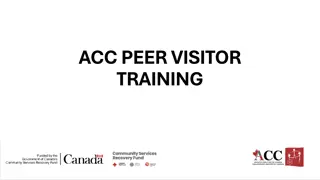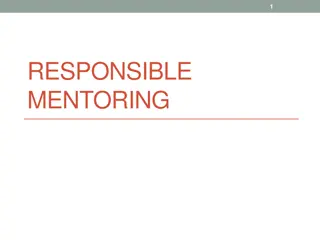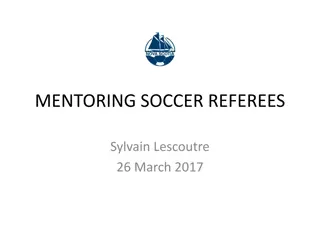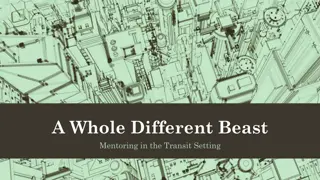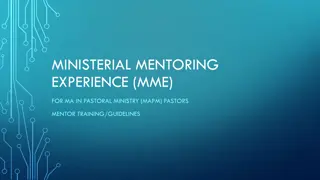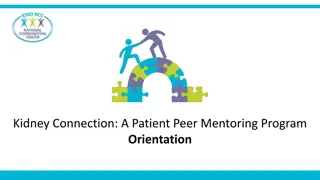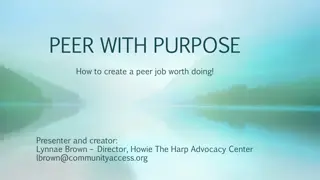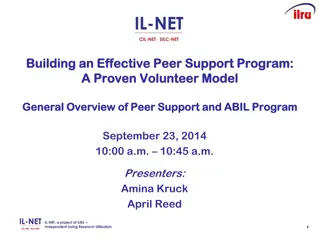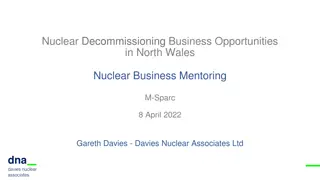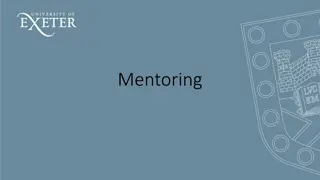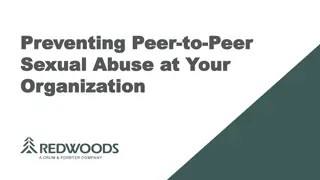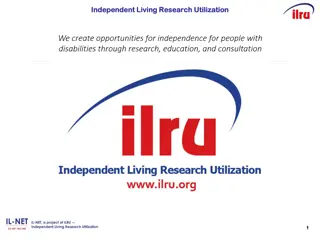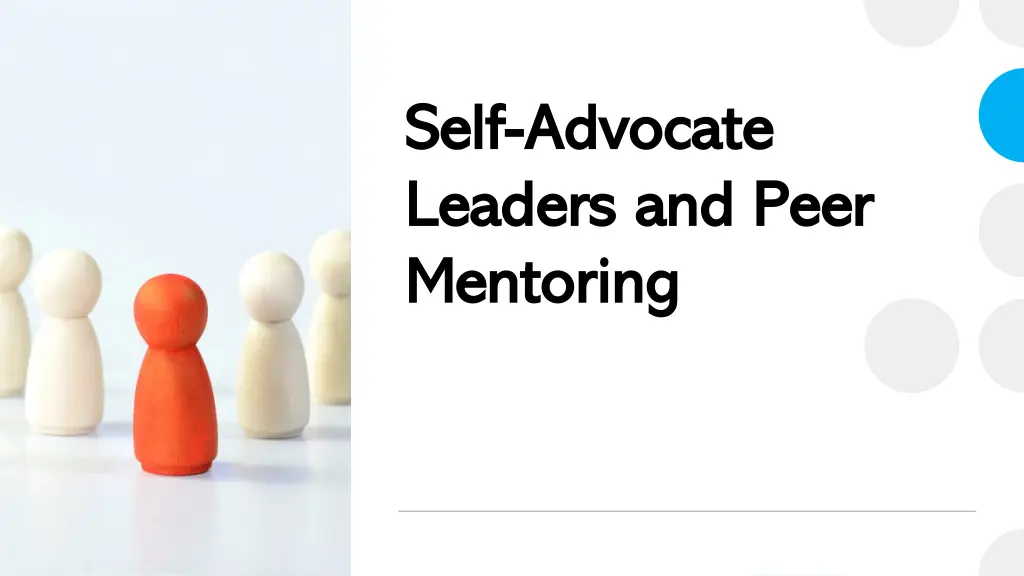
Peer Mentoring Program for Adults with Disabilities
Explore the Peer Mentoring Program aimed at providing adults with intellectual and developmental disabilities opportunities for support and mentorship. Peer mentors offer personal experiences to promote community inclusion and independence. Join us in building a supportive community!
Download Presentation

Please find below an Image/Link to download the presentation.
The content on the website is provided AS IS for your information and personal use only. It may not be sold, licensed, or shared on other websites without obtaining consent from the author. If you encounter any issues during the download, it is possible that the publisher has removed the file from their server.
You are allowed to download the files provided on this website for personal or commercial use, subject to the condition that they are used lawfully. All files are the property of their respective owners.
The content on the website is provided AS IS for your information and personal use only. It may not be sold, licensed, or shared on other websites without obtaining consent from the author.
E N D
Presentation Transcript
Self Self- -Advocate Advocate Leaders and Peer Leaders and Peer Mentoring Mentoring
Background and Overview Living Well is working with 10 self-advocate leaders and 8 service providers. Self-advocates provided peer to peer education in small groups, peer meeting, and some one-on-one assistance. Living Well wants to expand role to peer mentoring. Researched other states peer mentoring in long-term care Collaborated with Michigan and received all their materials.
Purpose of Peer Mentoring Program The purpose of a peer mentoring program is to provide adults with intellectual and developmental disabilities with opportunities to support, mentor and assist people with disabilities. The goal is to achieve community inclusion and participation, independence, and productivity from individuals with lived experience. Peer Mentors offer the benefit of their personal experiences, passing along encouragement and support to help others construct their own advocacy. .
Peer Mentors Role Create plans for their work together and the steps they will take to help the person meet their life goals. Prepare for their Person-Centered Planning (PCP) meetings and provide support at the meeting. Help connect people to resources for public benefits, housing, employment, transportation, training and education, advocacy, and recreation. Build a positive, trusting relationship to discuss problems and challenges and build on what is working.
Peer Mentor Qualifications and Requirements: Must be 18 years old. Must have an intellectual/developmental disability (IDD) Must be willing to share personal experiences to guide and support others. Experience receiving disability-related supports and services. Understand and be able to explain rights to the person they are mentoring. Obtain certification as a Peer Mentor through the Certifying Agency Ability to work in-person and virtually. Preferred experience: o lives or has lived independently (not in your family home) o has or has had a job in the community, and o is actively involved in your community.
Peer Mentor Special Knowledge and Ability Ability to be excited, honest, and upbeat with people. Ability to listen closely and work to find solutions to problems. Ability to support people to develop Self- Determination skills. Ability to find services and resources. Knowledge about local agencies Ability to develop relationships with agencies
Pilot Funding Under HCBS The Living Well grant would invite the MCO s participate in a pilot project until the time peer mentoring could be added to Wisconsin s Family Care and IRIS Waivers Peer Mentoring could be funding under the current service areas of Counseling and Therapeutic services (requires certification) and One:One Day Services
Peer Mentors in Training/Internships Peer mentors go through a training, internship and evaluation before becoming certified Michigan already trained 8 of the Living Well Self-Advocate Leaders Provider agencies would use the Living Well Self-Advocate Leaders who are already trained as their peer mentors BPDD could train additional individuals before the end of September 2024
Peer Mentors in Training/Internships The internship is 90 hours with 50% of the time providing mentoring The internship can take 6-9 months The provider agency would be the employer and would pay the peer mentor The peer mentor will be evaluated during the internship to get feedback on progress There will be a final evaluation at the end of the internship and if the mentor meets the goals they will be certified Peer would continue to work for the provider agency after certification.
Pilot Agency Responsibilities The provider agency would execute a contract with MCO for Peer Mentoring (Counseling and Therapeutic Resources or One:One Day Services) The provider agency is responsible to assure all training, documentation, and other contract requirements are met for this service The provider agency will hire peer mentor before beginning the internship The provider agency will provide supervision and support during the paid internship and assure all MCO requirements are met for waiver service The provider agency will bill the MCO for peer mentoring services
Pilot Agency Responsibilities Support the peer mentor with ongoing training requirements. Participate in monthly collaborative meetings during the pilot with BPDD, MCO s and provider agencies. Identify an agency liaison that is responsible for the success of the peer mentor pilot. Responsible for typical employer responsibilities including training, supervision and support, scheduling support, contract requirements including but not limited to background checks. Not responsible for service-related needs due to the person s disability as the employer (example: personal care, transportation, job coaching)
Managed Care Organization Role Identify how agencies will bill for the service. Collaborate with BPDD to train MCO staff on peer mentoring Support staff to use understand how to include in a person s plan using the RAD ( Resource Allocation Decision) Support staff on how to authorize the service in a person s plan. Contract for a limited term with provider agencies for the pilot. Participate in monthly meeting on the pilot including development of long-term service, quality standards, and rated.
BPDD Role Meet monthly with the peer mentors participating in the pilot. Provide technical assistance to the provider agency. Develop the Wisconsin Peer Mentor training structure by September 2024 Hold one additional training for peer mentors before September 2024. Collaborate monthly with the MCO s and provider agencies.. Gather data and prepare a report on the pilot project.
Agency Discussion: What are your overall thoughts on the proposal? What are we missing? Are there areas where we should provide more detail? What additional information should we include to go back to MCO s?
Self-Advocate Discussion: Do you have questions about the job description and the process to become a Certified Peer Mentor? What additional training and support do you feel you would need? What are we missing in the job description or knowledge needed to be a peer mentor?

